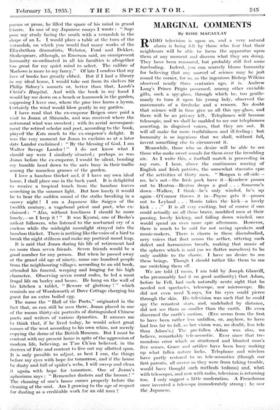MARGINAL COMMENTS
By ROSE MACAULAY
RADIO television is upon us, and a very natural alarm. is being felt by those who fear that their neighbours will be able to focus the apparatus upon them at any moment and discern what they are doing. They have been reassured, but probably still feel some foreboding. Indeed, you can scarcely blame humanity for believing that nny marvel of science may be just round the corner, for so, as the ingenious Bishop Wilkins Observed nearly three centuries ago, it is. Andrew • Lang's Prince Prigio possessed, among other enviable gifts, such a spy-glass, through which he, too gentle- manly to turn it upon his young lady, observed the movements of a firedrake and a remora. No doubt that science will in time give us all this spy-glass, and there will be no privacy left. Telephones will become telescopic, and we shall be enabled to see our telephonecs asserting, in disguised voices, that they are out. It will all make for more truthfulness and ill-feeling ; but -humanity is so ingenious that we shall, without fail, invent something else to circumvent it.
Meanwhile, those who so .desire will be able to see those who make sweet sounds for them over the trembling air. As I write this, a football match is proceeding in .my ears. I hear, above the continuous roaring Of English and Irish patriots, the somewhat staccato epic of the activities of thirty men. "Morgan is off-side--- no, he's not—the Irish pack have it—Kendrew passes out to Heaton—Heaton drops a goal . . . Someone's down—Walker, I think—he's only winded, he's up again—O'Connor throws it in—Payne gets it—passes out to Leyland . . Morris takes the kick—a lovely -kick . . ." It is all very exciting, but of course if one could actually see all those brave, muddied men at their -passing, lovely kicking, and falling down winded, one would spend an even more epic afternoon. However, there is much to be said for not seeing speakers and music-makers. There is charm in these disembodied, aery voices that float across the aether, uttering such dulcet and harmonious breath, making that music of the spheres which is said (so we flatter ourselves) to be only audible to the chaste. I have no desire to see these beings. Though I should rather like them to see me switching them off.
We are told (I mean, I am told by Joseph Glarivill, who presumably had it on good authority) that Adam, -before he Fell, had such naturally acute sight that he needed not spectacles, telescope, nor microscope. Ile did not even need X-rays, for his eyes could pierce through the skin. His television was such that he could spy the remotest stars, and, undeluded by distance, did not see them as smaller than the earth. He even discerned the earth's motion. (Eve seems from the first to have been rather less =fallen, or, anyhow, to have had less far to fall, so her vision was, no doubt, less tele -than Adam's.) The pre-fallen Adam was also, we believe, remarkably tele-acoustic. Ever since that tre- mendous error which so straitened and blunted man's five senses, Grace and artifice have been busy making up what fallen nature lacks. Telephone and wireless have partly restored to us tele-acoustics (though our first parents, all averse as they were from taking trouble, would have thought such methods tedious) and, what with telescopes, and now with radio, television is returning too. I only suggest a little moderation. A Frenchman once invented a telescope immoderately strong : he saw the Japanese.










































 Previous page
Previous page